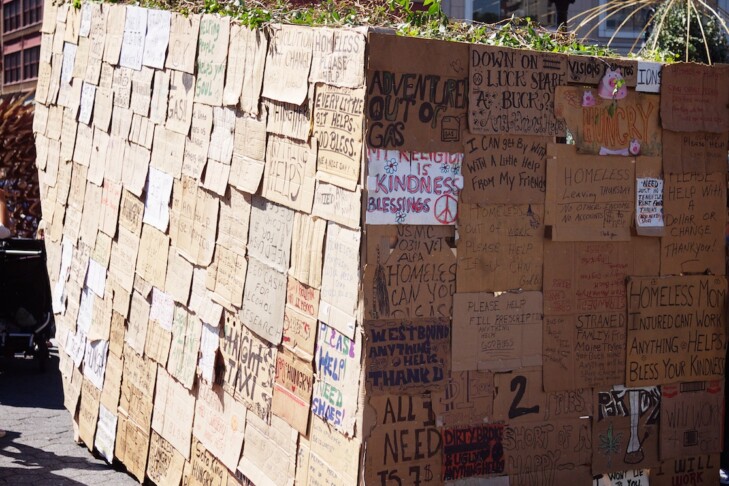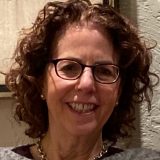Sukkot can be a magical time for all who celebrate, eating and sometimes sleeping outside under the sky with homemade decorations adorning the family sukkah. We imagine our ancestors wandering the desert for 40 years, living in temporary shelters and putting their faith in God, Moses, Aaron, Miriam (of course) and others to lead them to a better, more stable life. We are instructed to invite others to join us, including strangers, so that all may experience joy together, breaking down barriers between rich and poor and creating community among all who dwell nearby. After eight days we return to our comfy homes, dining tables and beds, as our ancestors ended their wandering and finally settled into their new homes. We look forward to repeating this ritual again next year.
But for many of our neighbors, life in a temporary shelter (or no shelter at all) is not a happy annual holiday, but a challenging reality 365 days a year. It’s hard to let Sukkot go by without thinking about the thousands of people in the Greater Boston area who do not have a comfy bed or a home to call their own. Like our ancestors, our homeless neighbors must put their faith in God, civic leaders and the support of the community around them through organizations like HomeStart to help them find a life they have dreamed about but for a variety of reasons have been unable to attain.
The sukkah has a dual meaning: It represents temporary shelter in an unwelcoming land and also the promise of redemption, a better life at the end of the journey. Can we offer this hope to our less-fortunate neighbors?
I believe we can. Last December I joined the team at HomeStart, a 26-year-old organization working to end and prevent homelessness. I first learned about HomeStart through CJP, where I worked for many years as a major gifts officer and director of The Miriam Fund. The data collected through CJP’s Anti-Poverty Initiative launched several years ago showed that housing instability was prevalent within the Jewish community, and a key contributor to family instability, leaving some on the brink of further disaster. Therefore, CJP made the strategic decision to invest in HomeStart as a way to help everyone, including our Jewish neighbors, get the help they need to hold on to the stability of home, thus preventing families and individuals from falling into even greater despair and poverty.
HomeStart’s clients live on the street, in shelters or are close to losing their homes. Our clients include single parents and their children, victims of domestic violence, veterans and persons with disabilities. HomeStart assists them in obtaining housing and settling into the community and, over the last 26 years, has permanently housed more than 14,000 households. In addition, HomeStart develops strategies to prevent homelessness before it starts and has prevented nearly 4,000 families from experiencing homelessness by using a combination of decades of experience working with public and private property owners, mediation techniques, legal advocacy and flexible monetary funds to assist people living at or below the poverty line.
This work is critically important right now. While the eviction moratorium has prevented disaster for so many families and saved thousands of lives (considered by some to be the third most effective intervention for preventing the spread of COVID, after the vaccine and masks), we know that hundreds of thousands of Massachusetts residents will be unable to pay their back rent and will face eviction once the moratorium is lifted.
Homelessness affects all of us—our entire community. We all benefit when families and communities are safe, parents can go to work and children can attend school. So this Sukkot, please consider your neighbors in need. To learn more about HomeStart and ways to help address this crisis, visit our website or watch this conversation with Matthew Desmond, Pulitzer Prize- winning author of “Evicted: Poverty and Profit in the American City,” and front-line staff and community partners on how COVID-19 has impacted homelessness across our city and nation, and what each of us can do now to help.
This post has been contributed by a third party. The opinions, facts and any media content are presented solely by the author, and JewishBoston assumes no responsibility for them. Want to add your voice to the conversation? Publish your own post here. MORE



